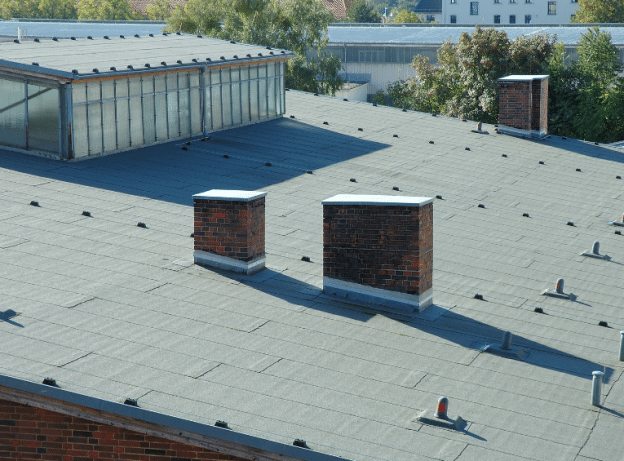Are you in need of a new roof for your home or business? If so, you may be wondering about the differences between residential and commercial roofing.
Roofing is a crucial aspect of any building, whether it’s residential or commercial. However, there are significant differences between the two types of roofing that make it essential to understand which one you need for your property. While both types have the same purpose of protecting the building from external elements, they differ in terms of design, materials used, and cost.
In this blog post, we’ll delve into the key differences between residential and commercial roofing to help you make an informed decision for your property. Let’s get to the list.
Design
Residential roofing is typically designed to blend in with the overall aesthetic of the house, while also providing functional protection. This means that residential roofs are often sloped or pitched and can include different design elements such as dormers, chimneys, and skylights.
You only need to work with an experienced roofing contractor to create a customized design that complements your home’s style. For instance, roofing experts in Springfield will consider the architectural design of your home to create a roofing solution that enhances its appeal. On the other hand, commercial roofing is more utilitarian and is designed primarily for practical purposes rather than aesthetics. This difference in design is mainly due to the varying needs of residential and commercial properties.
Materials Used
Residential roofing typically uses materials that are aesthetically pleasing, such as asphalt shingles, wood shakes, or clay tiles. These materials are chosen for their appearance and ability to withstand weather elements.
On the other hand, commercial roofs often use more durable and cost-effective materials like metal or single-ply roofing systems that can cover larger areas and require less maintenance. The type of material used for commercial roofs also depends on the specific function of the building, such as flat roofs for warehouse and industrial buildings or green roofs for offices and commercial complexes.
Cost
The cost of residential roofing is usually lower than that of commercial roofing. This is because residential properties are smaller in size, require less material, and have a simpler design. Additionally, the materials used for residential roofing can vary significantly in cost, allowing homeowners to choose an option that fits their budget.
Commercial roofing is more expensive as it involves a larger surface area and requires specialized materials and equipment for installation. The cost of commercial roofing can also vary depending on the specific needs of the building and any additional features or functions required.
Installation Process
The installation process for residential and commercial roofing also differs significantly. Residential roofing can often be installed using traditional methods, such as nailing down shingles or tiles. This process is relatively straightforward and can usually be completed within a few days.
Commercial roofing requires more complex installation techniques, such as heat-welding or adhesive bonding, due to the use of different materials. The installation process for commercial roofing can take longer and may require additional equipment and specialized training, making it a more involved and costly process.
Purpose/Function
The purpose or function of residential and commercial roofs is also another key difference between the two types. Residential roofs are primarily designed to protect the occupants of the house, along with the interior of the property, from external elements like rain, snow, and sunlight.
Commercial roofs, on the other hand, serve a more utilitarian purpose of protecting the entire building and its contents. This includes not only people but also equipment, inventory, and machinery. The function of commercial roofing may also vary depending on the type of building it covers, such as providing insulation for temperature control or supporting solar panels for energy efficiency.
Durability and Lifespan
Residential roofing usually has a shorter lifespan compared to commercial roofing. This is because residential roofs are not built to withstand heavy foot traffic, extreme weather conditions, or high levels of wear and tear. However, with proper maintenance and regular inspections, a residential roof can last for 20-30 years or more.
Commercial roofing is designed to be durable and withstand harsh conditions due to its larger size and intended function. The lifespan of commercial roofs can vary greatly depending on the materials used, but they typically have a longer lifespan than residential roofs. For instance, metal roofs can last up to 50 years, while single-ply roofing systems can last up to 30 years.
Maintenance Requirements
Residential and commercial roofs also differ in terms of maintenance requirements. Residential roofs typically require regular cleaning and inspections to ensure their integrity and prevent any damage or leaks. These tasks can usually be done by the homeowner or a local roofing company.
Commercial roofs, on the other hand, may require more frequent and extensive maintenance due to their larger size and complexity. This includes regular inspections, repairs, and cleaning by trained professionals to ensure optimal performance and prevent any potential issues that could disrupt business operations.
Legal Requirements
Finally, there are also legal requirements that differ between residential and commercial roofing. Residential roofing is subject to local building codes that dictate the type of materials and design elements that can be used. These codes are in place to ensure the safety and structural integrity of homes in a particular area.
Commercial roofing, on the other hand, must adhere to more stringent regulations, depending on the size and function of the building. This can include fire safety codes, energy efficiency requirements, and adherence to zoning laws. It’s essential for commercial property owners to work with roofing contractors who are knowledgeable about these regulations and can ensure compliance during the installation process.
While residential and commercial roofing both serve the purpose of protecting a building, they differ significantly in terms of design, materials used, cost, installation process, function, durability and lifespan, maintenance requirements, and legal regulations. It’s important to understand these differences when considering which type of roofing is best for your property. By working with experienced and knowledgeable roofing professionals, you can ensure that your roof meets both your aesthetic and practical needs. They will also be able to guide you in choosing the most suitable roofing solution for your budget and provide regular maintenance to keep it in top condition for years to come.


